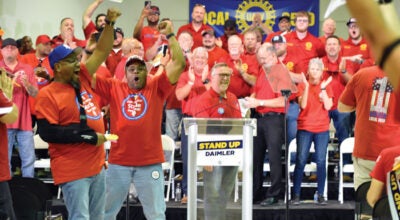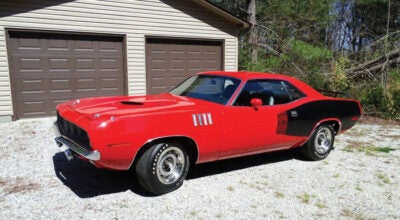Broyhill talks history with Salisbury Civitans
Published 12:00 am Friday, September 7, 2012
By Mark Wineka
mwineka@salisburypost.nc
SALISBURY – As a N.C. congressman in the mid 1970s, Jim Broyhill became fascinated with the Revolutionary War history connected with Kings Mountain.
Back then, he successfully worked with historians and local officials in having the Overmountain Victory Trail added to the National Historic Trail system. Today it’s one of only 18 trails in the country with that designation.
Broyhill has worn many hats in his life: U.S. House representative, U.S. senator, N.C. Commerce secretary and furniture industry executive among them.
But these days, he’s just as happy being a history buff. He visited the Salisbury Civitan Club Thursday to give a program on the 1780 Battle of Kings Mountain – a patriot victory in the Revolutionary War that Thomas Jefferson called “the turn of the tide of success.”
Fought Oct. 7, 1780, the battle was the first significant patriot victory after the British invasion of Charleston, S.C., in May 1780.
Many reputations were made that day and in the Southern battles to follow in places such as Cowpens and Guilford Courthouse. Within a year, Lord Cornwallis would surrender at Yorktowne, Va., and by Sept. 3, 1783, the Treaty of Paris brought the Revolutionary War to an end.
On the British side, a name that lives in infamy with Americans was Scotsman Patrick Ferguson, a Redcoat major who was shot and killed at Kings Mountain.
He was so hated that the Overmountain Men – backwoods hunters from Virginia, Tennessee and the Carolinas – rallied to a cry of “Find Ferguson” on their way to the showdown with his loyalist forces at Kings Mountain.
A Lenoir native and former executive with Broyhill Furniture Industries, Broyhill retired from public service in 1992 but not from public life, assuming roles on numerous boards of companies, schools and non-profits.
(He received an honorary doctor of laws degree from Catawba College in 1966.)
Civitan Dave Clay introduced the 85-year-old Broyhill Thursday at the club’s meeting. Clay’s niece is Broyhill’s daughter-in-law, and there’s an additional connection by marriage that prompted Broyhill to declare them genuine “kissing cousins.”
The first rule he learned in politics, Broyhill said, was to try and show you are related to as many people as possible.
By coincidence, the Rowan County History Club will have a program at 7 Tuesday night on “The Heroic Campaign to the Battle of Kings Mountain.”
It will describe the American-Whig rebels from the backcountry who became incensed at Ferguson’s declaration that he would burn homes and barns and hang all of the rebellion’s leaders if they did not surrender and swear allegiance to the crown.
Confronting the enemy
The “Overmountain Men” were probably underrated by the British as fighters. They already had endured six years of conflicts with several tribes of Indians, loyalist Tories, Scottish Highlanders and others.
They marched over the Appalachians to confront Ferguson’s army atop Kings Mountain.
Randell Jones, a “Roads Scholar” speaker with the N.C. Humanities Council, will be give the Tuesday night program for the History Club at the Rowan Museum, 202 N. Main St.
In 1780, Broyhill noted, the Revolutionary War was five years old, and the patriots were facing defeat. Their resources were exhausted, the Continental Congress-issued money was almost worthless, and the paper money being printed by the states had zero value.
Despite assistance from the French after a patriot win in Saratoga, N.Y., in 1777, the British controlled all the Northern ports. They turned to a Southern strategy that heavily involved recruiting and training men who were still loyal to England.
At the time, Broyhill said, about a third of the population were loyalists, a third patriots and a third neutral.
The British seized the ports at Savannah, Ga., and Charleston, and they met little resistance early on in the South because of the lack of any significant Continental Army force.
Cornwallis ordered the pacification of South Carolina after the Battle at Camden, and he prepared for his invasion of North Carolina.
He told Ferguson, who had a trained loyalist force of 1,100 men, to go west and pacify that region while also guarding Cornwallis’ left flank as he advanced toward Charlotte.
Ferguson hardly pacified the region by sending a messenger into the mountains with his famous threat.
The Overmountain Men gathered at Quaker Meadows (today’s Morganton, marched to Gilberton and Cowpens and made an overnight march to Kings Mountain where, thanks to a recent rainfall, they were able to encircle Ferguson and the mountain before they were detected.
During the two-hour battle the next day, Broyhill said, patriot sharpshooters killed Ferguson.
The patriot forces also captured Ferguson’s men, which represented about a fourth of Cornwallis’ small southern army.
The western defeat sent Cornwallis back to Winnsboro, S.C., to regroup. Meanwhile, Nathanael Greene became commanding general in the South. He divided his forces in Charlotte as Cornwallis prepared to invade North Carolina again.
Squaring off
This time the western British forces were commanded by Banastre Tarlton, who had a reputation for taking no prisoners. Tarlton’s men were met by Gen. Daniel Morgan’s forces and defeated at the Battle of Cowpens.
Cornwallis and Greene eventually squared off at Guilford Courthouse (today’s Greensboro), and though Cornwallis technically won, his army was crippled from its losses.
The patriots associated with Kings Mountain and other Southern battles during the war were later showered with positions and honors, Broyhill noted.
They became, for example, governors, congressmen and judges and had counties and cities named for them.
The names included Greene, Morgan, John Sevier, Isaac Shelby, Benjamin Cleveland, Joseph McDowell, Andrew Pickens, William Lenoir, Jesse Franklin and Joseph Winston.
Ferguson, who lost his life at the Battle of Kings Mountain, was buried under a mound of rocks at the foot of the mountain. He was so despised, it became a time-honored tradition for visitors to throw a rock on his burial site.
“I was there the other day,” Broyhill said, “and I threw another rock on his grave.”
Contact Mark Wineka at 704-797-4263.





